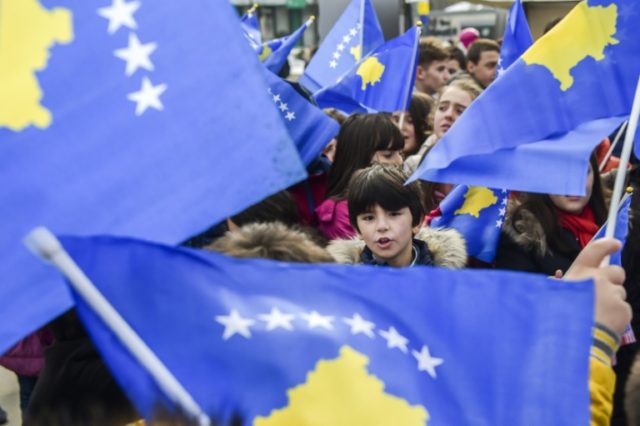Pristina (AFP) – Kosovo, which celebrates 10 years of independenceon Saturday, has a flag that few people care about, four international telephone codes and a judoka hero.
Here are five things to know about the youngest European country.
– ‘Towel’ for a flag –
Kosovo’s flag bears the shape of its territory and six yellow stars, for its six main ethnic groups, on a blue background.
It is mockingly called a towel by members of Kosovo’s ethnic Albanian majority, who believe it was adopted largely to please Western patrons.
The flag flown all over Kosovo is that of neighbouring Albania — a black double-headed eagle on a red background.
The American stars and stripes are also prevalent, owing to Washington’s strong support in Kosovo’s struggle for independence from Serbia.
In the areas that are home to Kosovo’s ethnic Serb minority, the “towel” is rarely seen and instead the Serbian flag dominates.
– Four telephone codes –
Owing to Serbia’s opposition to independence, three other countries’ dialling codes are in use in Kosovo: Serbia’s +381 for landlines plus Monaco’s +377 and Slovenia’s +386 for mobile phones.
Kosovo was allocated +383 as its own code after striking a deal with Belgrade. This is already being used on the popular messaging app Viber and due to be fully operational later this year.
– Judo icon –
Kosovo beat its big brother Albania to an Olympic medal during the country’s first appearance at the Games, in Rio in 2016, when national heroine Majlinda Kelmendi took gold in judo.
Kosovo uses sport as a diplomatic tool and gained admission to the International Olympic Committee in 2014 to the great displeasure of Serbia.
It proudly celebrated skier Albin Tahiri, Kosovo’s lone athlete in last week’s opening parade in Pyeongchang and its first sportsman in a Winter Olympics.
– Powerful diaspora –
Kosovo is home to around 1.8 million people but another 700,000 Kosovo Albanians are estimated to live abroad, mostly in Germany and Switzerland.
The diaspora, which has its own ministry, sent some 620 million euros ($760 million) to Kosovo in the first 10 months of 2017, making it a major contributor to the functioning of the country, alongside international aid.
– Cathedral of gratitude –
Some 95 percent of Kosovo Albanians are Muslims, but one of the Balkan region’s largest Roman Catholic cathedrals sits in the centre of Pristina.
Dedicated to Saint Mother Teresa, of ethnic Albanian heritage, the church is a symbol of gratitude to the West for supporting independence.

COMMENTS
Please let us know if you're having issues with commenting.